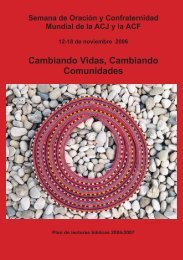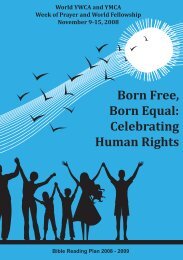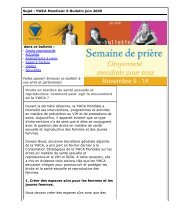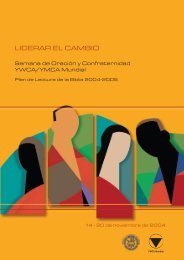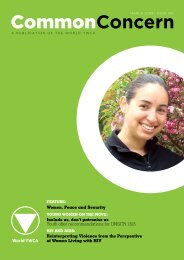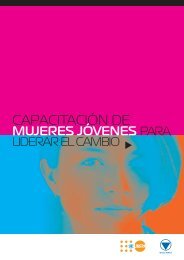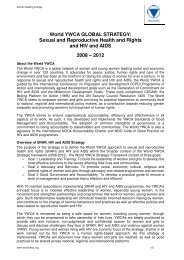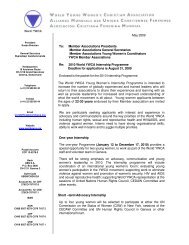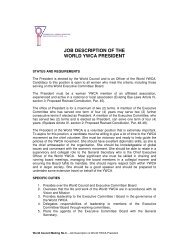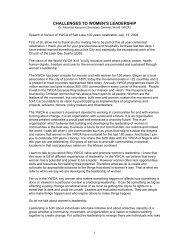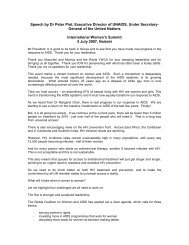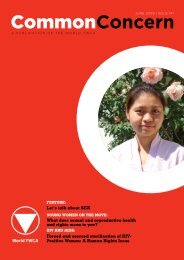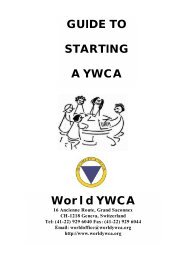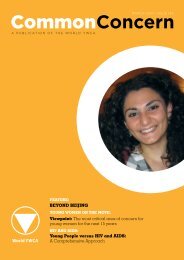If I kept it to myself - World YWCA
If I kept it to myself - World YWCA
If I kept it to myself - World YWCA
You also want an ePaper? Increase the reach of your titles
YUMPU automatically turns print PDFs into web optimized ePapers that Google loves.
<strong>If</strong> I <strong>kept</strong> <strong>it</strong> <strong>to</strong> <strong>myself</strong><br />
of Health <strong>to</strong> train volunteer home based care<br />
givers. I was 20 years old at the time, <strong>to</strong>o young<br />
<strong>to</strong> be accepted in<strong>to</strong> the training programme as<br />
a care giver. But I was eager <strong>to</strong> be involved and<br />
consequently was assigned <strong>to</strong> administration and<br />
public relations for the training programme. Since<br />
late 1999, I have been co-ordinating the home<br />
based care programmes in Bergville. We have 72<br />
caregivers in a commun<strong>it</strong>y of 140,000 inhab<strong>it</strong>ants.<br />
Our target groups are orphans, youth, widows and<br />
HIV pos<strong>it</strong>ive people. I mobilise and co-ordinate<br />
NGOs and representatives from local government<br />
departments <strong>to</strong> form an intersec<strong>to</strong>ral team for<br />
AIDS Action that meets every two months.<br />
I work w<strong>it</strong>h commun<strong>it</strong>y leaders by men<strong>to</strong>ring<br />
and valuing HBC home based caregivers,<br />
fundraising w<strong>it</strong>h church leaders and farmers, and<br />
have an audience w<strong>it</strong>h pol<strong>it</strong>ical leadership. Our<br />
government does not worry about continuum<br />
of care outside health facil<strong>it</strong>ies, which is why<br />
caregivers are not recognised for their work.<br />
Yet they are very important women who help<br />
our society <strong>to</strong> care for the sick and orphaned.<br />
This is why in 2004 I addressed our Premier, Mr.<br />
Sbusiso Ndebele, asking him <strong>to</strong> recognise the<br />
hard work and dedication of volunteer caregivers<br />
in our commun<strong>it</strong>ies.<br />
When someone has AIDS, the family usually<br />
has no idea how <strong>to</strong> cope. Because of the nature<br />
of the illness, the patient will suddenly develop<br />
new opportunistic infections that can frighten the<br />
family. The carers show the family how <strong>to</strong> deal<br />
w<strong>it</strong>h these new symp<strong>to</strong>ms in the best possible<br />
way. As a result, clients and their families are<br />
able <strong>to</strong> confide their fears and challenges <strong>to</strong><br />
carers, and that is often more important than<br />
the l<strong>it</strong>tle medical help we have <strong>to</strong> offer. Our<br />
responsibil<strong>it</strong>y is also <strong>to</strong> help the clinic come <strong>to</strong><br />
the patient, when our clients are desperate for<br />
help. Because the commun<strong>it</strong>y doc<strong>to</strong>rs are in the<br />
clinics most of the time, they seldom get <strong>to</strong> the<br />
people in the rural areas who are <strong>to</strong>o ill <strong>to</strong> walk<br />
the distance.<br />
52<br />
Since September 2004, in association w<strong>it</strong>h the<br />
caregivers and Dr. Moll from the Tugela Ferry<br />
Church of Scotland Hosp<strong>it</strong>al at Umsinga, we<br />
introduced an anti-retroviral (ARV) treatment<br />
programme, involving over 30 patients. The<br />
Bergville-Okhahlamba Hosp<strong>it</strong>al, which is<br />
closest has no ARV treatment facil<strong>it</strong>ies but<br />
through the relationship developed w<strong>it</strong>h the<br />
hosp<strong>it</strong>al at Umsinga, 300 km away, many<br />
people are now receiving treatment. The<br />
treatment is free but they have <strong>to</strong> pay for<br />
transport and food while they are at the<br />
hosp<strong>it</strong>al. We don’t have a vehicle <strong>to</strong> transport<br />
them so they hire private vehicles.<br />
When we began providing treatment <strong>to</strong> our<br />
clients the Treatment Action Campaign (TAC) did<br />
training w<strong>it</strong>h us. This helped us <strong>to</strong> understand the<br />
issues of treatment and we incorporated these<br />
in<strong>to</strong> our HBC work.<br />
The whole issue of disabil<strong>it</strong>y grants provided by<br />
the government is a difficult one. Most people<br />
desperately need the money because they<br />
are starving but are <strong>to</strong>o ill <strong>to</strong> go <strong>to</strong> government<br />
departments <strong>to</strong> fetch their money. They also only<br />
qualify for a disabil<strong>it</strong>y grant when their immune<br />
system CD4 count is so low that they can barely<br />
walk. I try <strong>to</strong> use my office telephone as much<br />
as possible <strong>to</strong> sort out these problems, but the<br />
system is not quick. Many people die before they<br />
are paid their due.<br />
We facil<strong>it</strong>ated the distribution of 38 <strong>to</strong>ns of maize<br />
donated by farmers in the area. The HBC givers`<br />
team identified the most needy households,<br />
particularly those caring for children affected by<br />
AIDS, and w<strong>it</strong>h no income or financial assistance<br />
through social grants. The farmers also pay for<br />
school fees and buy clothing for those children<br />
who are not receiving government grants. The<br />
government gives monthly grants for foster<br />
care, child care and care dependency children.<br />
I have helped one of our clients <strong>to</strong> secure the



